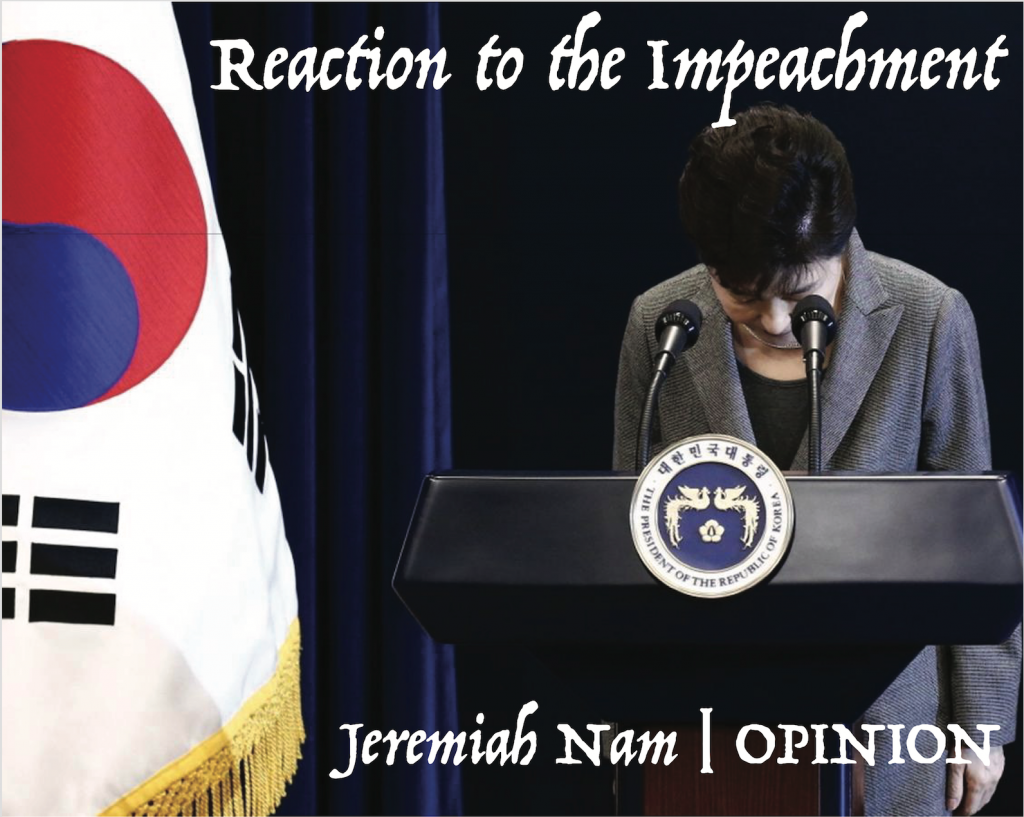Flipping through the TV channels on the night of President Park’s impeachment felt like watching another installment in the Fast and Furious franchise. News vans raced each other on the freeway, inching past each other to get the scoop on the biggest news story of the year. At the front of the chase was a jet black Hyundai Grandeur, and inside sat the infamous ex-President Park Geun Hye. As the car reached a house near the Gangnam Ward Office, Park exited the vehicle and was greeted by two crowds, one lamenting her impeachment and one supporting it. Park proceeded to release a few vague statements on truth, and then abruptly disappeared from the scene––ending a two-hour long news segment in less than two minutes.
For my leaning-as-far-left-as-left-will-go mother, this scandal was all she could talk about for the past couple of months. All she wanted to see was President Park leave office as soon as possible and spurned the pushing back of the hearings. But as soon as it all blew over and the credits rolled for the news segment, when I looked over to her she was not celebrating. Rather, as she stared at the commercials that ran after the segment she said: “is that it?”
I shared these exact sentiments with my mom, that of which can only be described as bittersweet anticlimax. On one hand, we were proud; our nation was able to put its republic to the test and force corruption out of the office, marking a definite victory for democracy. On the other hand, however, we were ashamed. For over four years we had let corruption plague the most vital position in the country––right under our noses, least of all. If the scandal had been kept under wraps for just a couple more months, we may never have unearthed the kind of fraud that compromised the integrity of our nation. In this way, the end to the scandal was still only the end, and it did not erase the fact that our nation had hit a bleak point in its history.
The most interesting reaction of all to the scandal, however, came not from my mom or from me, but from my own grandmother. A right-leaning conservative, she supported Park Geun Hye throughout her campaign and passionately defended her through the questionable policies during her presidency. Because of this, when the scandal erupted into the Korean mainstream, I half expected her to begin defending her as well. While she did not join the anti-impeachment movement she refused to rebuke her and instead felt a kind of sympathetic pity for her. I questioned her about these sentiments, wondering how one could still support her after the implications that Park’s actions could have had on our nation.
My grandmother responded with a surprising amount of self-awareness and sagaciousness, telling me that people from her generation saw Park as a reflection of their own identity. Raised in a time of economic despair had taken a toll on the now elderly population of Korea, and growing up with Park as a child icon on television meant that they sympathized with her as the embodiment of their struggle. As Korean society mutated rapidly in the last two decades––abandoning traditional Confucian values and moving to the future at alarming speeds––much of the elderly generation felt as if they were being left out and behind of today’s Korea. For them, the election of Park symbolized a hopeful preservation of themselves and their values. So when their morning star fell from grace it was ultimately very difficult to take for them, and for some they dealt with the situation using denial.
My grandmother’s explanation opened up a new perspective for me to these anti-impeachment groups, of which until now people like my mother and I had the utmost contempt for. It showed me that while you might truly know in your heart-of-hearts that whatever political view you have is right, ultimately it is unethical and exacerbating to spurn your challengers with insults and affronts. They may be wrong, but especially with violent riots from both sides continuing to occupy our nation after the impeachment, we must attempt to understand the perspective of others instead of scorning them.
Nobody benefited from the scandal that beleaguered every facet of our nation for the last couple of months. Both liberals and conservatives found themselves disappointed and disillusioned, with everything they knew about Korean society challenged. However, one thing is for sure: only by being constructive with one another will we be able to reform our nation to the great democracy it intends to be.

